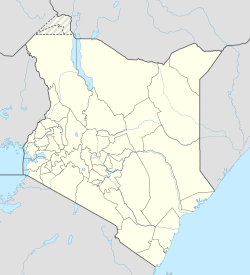Kileleshwa
Kileleshwa | |
|---|---|
| Coordinates: 01°16′37″S 36°47′35″E / 1.27694°S 36.79306°E | |
| Country | Kenya |
| County | Nairobi City |
| Sub-county | Westlands |
| Area | |
| • Total | 5.3 km2 (2.0 sq mi) |
| Population (2019)[1] | |
| • Total | 22,216 |
| • Density | 4,229/km2 (10,950/sq mi) |
Kileleshwa is a residential neighbourhood in the city of Nairobi. It is located approximately 5.2 kilometres (3 mi) from Nairobi's central business district. The neighbourhood was originally a low-density leafy suburb but after a change in zoning regulations in the early 2000s, there has been significant mushrooming of high-rise flats in the area. It hosts mainly the upper middle class segment of Nairobi residents.
Location
[edit]Kileleshwa is located approximately 5 kilometres (3 mi) west of Nairobi's central business district, within the larger sub-county of Westlands. It is east of Lavington; south of Muthangari, and west of Kilimani, mainly separated by the Kirichwa River.
Overview
[edit]Kileleshwa hosts a significant population of the upper middle income population of Nairobi.[2] The neighbourhood has historically been primarily low-density residential, but since the early 2000s, Kileleshwa and its environs have become increasingly high-density mixed residential and commercial; both retail and offices, due to the zoning laws in the area being changed.[3][4][5] Some of the high-rise buildings have been built contrary to the county's bylaws and have been characterised as vertical slums due to them burdening the existing laid infrastructure.[6][7] Residents of Kilimani and Kileleshwa have also raised concerns about the increasing number of nightclubs in the areas.[8]
In March 2024, Nairobi Governor Johnson Sakaja proposed a re-zoning that would allow the construction of buildings up to 75 floors in Kilimani, Kilelelshwa, and Lavington.[9]
Kileleshwa, an electoral ward within the Dagoretti North Constituency, borrows its name from the estate, encompassing other estates and neighbourhoods such as: Chiromo, Groganville, Kileleshwa, Muthangari and Riverside.[10]
As per the 2019 census, Kileleshwa had a population of 22,216, with a population density of 4,229/km2 in a land area of 5.3km2.[1]
Real Estate Trends
[edit]Over the past two decades, Kileleshwa has experienced rapid urbanisation, marked by a surge in high-rise apartment buildings. Originally a low-density area, zoning law adjustments in the early 2000s allowed for more intensive development.[11] This has led to mixed reactions from residents, with some appreciating the area's accessibility while others decry the strain on local infrastructure.[2] The proliferation of high-rise flats has also significantly impacted property values, making Kileleshwa a popular residential area for upper-middle-class residents.[3]
Points of interest
[edit]- Schools
The Kenya High School is located in Kileleshwa.[12]
References
[edit]- ^ a b "2019 Kenya Population and Housing Census Volume II: Distribution of Population by Administrative Units". Kenya National Bureau of Statistics. p. 251. Retrieved 12 December 2022.
- ^ a b "Ideal areas to live in Nairobi; For different incomes". www.cytonn.com. Retrieved 16 July 2024.
- ^ a b Limbe, Lydia (4 July 2013). "Nairobi's leafy suburbs mutate in office boom". The Standard (Kenya). Nairobi. Retrieved 11 November 2022.
- ^ "About Kileleshwa". Hauzisha. 30 March 2022. Retrieved 11 November 2022.
- ^ Muiruri, Peter. "Why Kileleshwa is becoming like Kayole, Umoja". The Standard. Nairobi. Retrieved 11 November 2022.
- ^ Mugambi, Hassan (30 April 2023). "Vertical Slums: How New Crop Of Apartments In Kilimani, Kileleshwa Is Affecting Nairobi's Infrastructure". Citizen Digital. Retrieved 10 May 2023.
- ^ Wambui, Mary (6 February 2023). "How Kilimani, Kileleshwa are fast turning into Nairobi's new 'slums'". Nation. Retrieved 10 May 2023.
- ^ "We can't sleep, city residents decry noise from nightclubs". The Star. Retrieved 29 March 2024.
- ^ "Expect 75-storey buildings in Nairobi if Assembly approves zoning framework". Citizen Digital. 25 March 2024. Retrieved 2 April 2024.
- ^ "Kileleshwa County assembly ward". Dagoretti North CDF. Nairobi. Retrieved 11 November 2022.
- ^ Digital, Standard. "Why Kileleshwa is becoming like Kayole, Umoja". Standard Entertainment. Retrieved 29 September 2024.
- ^ "Kenya High School fee structure, entry marks, address, contacts". Tuko. Retrieved 11 November 2022.


 French
French Deutsch
Deutsch
